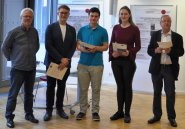Requirements and Recommendations
 Requirements
Requirements
The courses of the Marsilius Study Program can be completed as part of an undergraduate or doctoral degree. They are open to anyone interested in attending. It is recommended that students are at least in their third degree semester when they begin. Students will recieve a Marsilius Certificate upon successful completion of the program. The requirements for earning a certificate are enumerated under § 5 of the Statute of the Marsilius Study Program. Minimum requirements include
- active participation (including coursework) in two 'bridge' seminars,
- completion of a discipline-specific course for non-majors (alternative: a third 'bridge' seminar) and
- presentation and discussion of a (final) paper in a colloquium.
From 2020 on it is possible to substitute one class categories A (bridging seminars) or C (from a different discipline) by participating in four half-day workshops of the Springer Nature Visiting Professorship. The workshops may be attended in different terms.
Individual faculties have the final decision in the appropriate number of credits to be given towards a degree, however the Marsilius Kolleg will make a recommendation.
Introductory courses for non-majors will also be included on the certificate.
Further course recommendations
In addition to our own course offerings, we also recommend the following:
- introductory courses in other disciplines and methods
- the multidisciplinary course pool of the Faculties of Modern Languages, Philosophy and Theology (for non-majors)
- the Studium Generale (general education courses)



